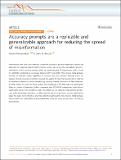Accuracy prompts are a replicable and generalizable approach for reducing the spread of misinformation
Author(s)
Pennycook, Gordon; Rand, David G
DownloadPublished version (1.446Mb)
Publisher with Creative Commons License
Publisher with Creative Commons License
Creative Commons Attribution
Terms of use
Metadata
Show full item recordAbstract
<jats:title>Abstract</jats:title><jats:p>Interventions that shift users attention toward the concept of accuracy represent a promising approach for reducing misinformation sharing online. We assess the replicability and generalizability of this accuracy prompt effect by meta-analyzing 20 experiments (with a total <jats:italic>N</jats:italic> = 26,863) completed by our group between 2017 and 2020. This internal meta-analysis includes all relevant studies regardless of outcome and uses identical analyses across all studies. Overall, accuracy prompts increased the quality of news that people share (sharing discernment) relative to control, primarily by reducing sharing intentions for false headlines by 10% relative to control in these studies. The magnitude of the effect did not significantly differ by content of headlines (politics compared with COVID-19 related news) and did not significantly decay over successive trials. The effect was not robustly moderated by gender, race, political ideology, education, or value explicitly placed on accuracy, but was significantly larger for older, more reflective, and more attentive participants. This internal meta-analysis demonstrates the replicability and generalizability of the accuracy prompt effect on sharing discernment.</jats:p>
Date issued
2022-12Department
Sloan School of ManagementJournal
Nature Communications
Publisher
Springer Science and Business Media LLC
Citation
Pennycook, Gordon and Rand, David G. 2022. "Accuracy prompts are a replicable and generalizable approach for reducing the spread of misinformation." Nature Communications, 13 (1).
Version: Final published version